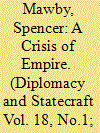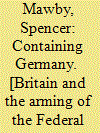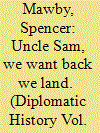| Srl | Item |
| 1 |
ID:
076731


|
|
|
|
|
| Publication |
2007.
|
| Summary/Abstract |
The crises which accompanied the rise and decline of the European empires have not been the object of systematic study in the manner of superpower crises of the Cold War period. Many of the techniques used to study Cold War crises have broader scope, including the models of governmental politics and organisational process developed by Graham Allison. The application of the Allison models to the events surrounding the delimitation of the Aden frontier between 1901 and 1905 illuminates significant aspects of the Anglo-Ottoman confrontation: they explain the manner in which non-rational elements in the policy-making process transformed a relatively insignificant issue into a crisis situation. Such insights also require a detailed examination of the documentary record which in this instance reveals the discord amongst British policy-makers and the organisational imperfections of the bureaucracy. The frontier Commissioners, the Aden Resident, the Government of India, the metropolitan government in London and the embassy in Constantinople were involved in a series of factional squabbles over the Aden frontier, the resolution of which often required the coercion of the Ottomans by the deployment of warships along the Yemen coast. Coordination amongst these different elements in the bureaucracy also played a role in generating tensions between London and Constantinople. The case of the Anglo-Ottoman dispute over the Aden frontier suggests that the analysis of internal governmental politics and organisational processes can be applied successfully to crises of empire which predate the Cold War era.
|
|
|
|
|
|
|
|
|
|
|
|
|
|
|
|
| 2 |
ID:
048400


|
|
|
|
|
| Publication |
Hampshire, macmillan Press, 1999.
|
| Description |
xi, 244p.
|
| Series |
Contemporary history in context series
|
| Standard Number |
0333735811
|
|
|
|
|
|
|
|
|
|
|
|
Copies: C:1/I:0,R:0,Q:0
Circulation
| Accession# | Call# | Current Location | Status | Policy | Location |
| 041574 | 355.0310943/MAW 041574 | Main | On Shelf | General | |
|
|
|
|
| 3 |
ID:
121162


|
|
|
|
|
| Publication |
2012.
|
| Summary/Abstract |
The American acquisition of military and naval facilities at Chaguaramas in Trinidad during World War II led to a significant Anglo-American controversy during the late 1950s. In 1957 the Chief Minister of Trinidad, Eric Williams, began a campaign to eject the Americans from the base. Members of the Eisenhower administration regarded the campaign as evidence of anti-Americanism and the US Navy sought to undermine Williams by cooperating with his opponents. This interference was resented by British policy-makers who were planning to grant independence to Trinidad as part of a West Indian federation. The resulting Anglo-American disagreement continued until a compromise, which allowed the United States to retain the base in return for economic aid, was reached in 1961. The episode is significant in demonstrating that Washington was concerned about incipient anti-Americanism within the Anglophone Caribbean and in signifying British determination to defend their remaining colonial interests after the Suez crisis.
|
|
|
|
|
|
|
|
|
|
|
|
|
|
|
|